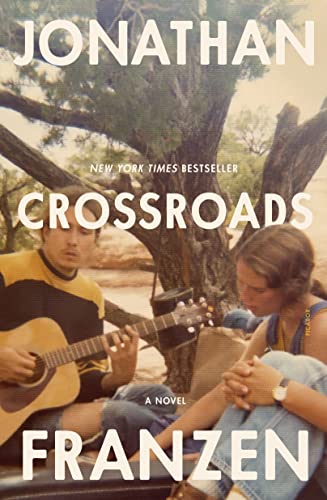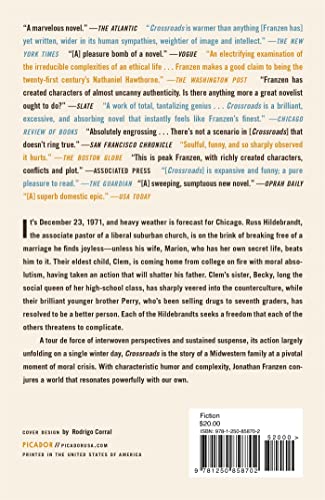Hey there, folks! Today, we’re taking a closer look at Jonathan Franzen, a book that has garnered quite a bit of buzz. This review is all about giving you the lowdown on the character development, plot, writing style, and themes. Let’s see if this book is worth your time, shall we?
In a nutshell
Author: Jonathan Franzen
Genre: Literary Fiction
Jonathan Franzen’s book delves deep into the complexities of modern life and human relationships. With a focus on family dynamics, technology’s impact on our lives, and environmental concerns, Franzen weaves a rich and thought-provoking narrative. He’s known for creating detailed characters and plots that are both intricate and slow-paced, making his books a mix of poetic and sometimes tedious. If you enjoy literary fiction that challenges your thoughts and keeps you reflecting long after you’ve turned the last page, this book is worth a read.
Character Development and Depth in Jonathan Franzen’s Works
If you ever felt like your life was a juggling act, you might relate to the characters Jonathan Franzen writes. Franzen crafts characters with a precision that makes you feel like you could run into them at the local grocery store. I once read ‘The Corrections’ while waiting for a delayed flight. By the time they announced boarding, I was so immersed in the Lambert family’s flaws and feats, I almost missed my plane!
Franzen’s characters are not superheroes. They are everyday people with quirks, flaws, and dreams. Take Chip Lambert from ‘The Corrections.’ He’s a walking disaster but you can’t help rooting for him. This guy gets fired from his teaching job and attempts a get-rich-quick scheme in Lithuania. You can see Franzen’s genius in how he makes Chip’s bad decisions feel so human and relatable.
However, sometimes Franzen’s focus on character depth can bog down the pace. I remember thinking, ‘Okay, I get it, Chip is a mess,’ but wishing we’d get back to the main story. His characters are detailed but can sometimes overshadow the plot. Think of it as getting lost in a very fascinating but rather long conversation.
All in all, Franzen’s talent for character development is a highlight, even if it occasionally slows things down. It’s like getting a super detailed sketch at a comic book convention – you appreciate the detail, but man, does it take a while.
Stick around because next up, we’re zooming into Franzen’s knack for plotting and how he keeps the storytelling engine chugging along.
The Plot and Storytelling Pace in Jonathan Franzen’s Work
When it comes to plot and storytelling pace, Jonathan Franzen’s books can be a mixed bag. Franzen’s narratives often take their sweet time to unfold, and this can be both a pro and a con. I remember reading The Corrections and feeling like the plot was moving slower than a snail on a lazy Sunday. It’s clear he loves to build worlds, but sometimes, you’ll need a second cup of coffee to stay engaged!
One thing’s for sure: Franzen is a master at creating intricate plots. He weaves in subplots like your grandma weaves in stories about her younger days. Each subplot adds depth, but they can also make the main plot harder to follow. In Freedom, for example, you might find yourself flipping back a few pages to remember who is related to whom and why they are important. It’s like playing a game of Cluedo but with more existential crises.
On the flip side, the slow pace allows you to savor every detail. It’s like enjoying a seven-course meal versus fast food. Franzen gives you time to soak in the environment, understand the motivations of the characters, and genuinely feel their struggles. If you are someone who cherishes deep, slow-building stories, you’ll appreciate this pace. If not, well, you might find yourself wishing for a bit more action.
Up next, we’ll chat about Franzen’s writing style and language. I promise it will be a hoot!
Writing Style and Language in Jonathan Franzen’s Work
Jonathan Franzen’s writing style reminds me of that one picky relative who always shows up to family dinners with a thesaurus under their arm. It’s detailed, nuanced, and sometimes leaves you reaching for a dictionary. Franzen has this knack for capturing the mundane in an almost poetic way. Imagine reading about doing the dishes and somehow feeling like it’s the most profound activity of your life. That’s Franzen for you!
His language can be both a gift and a curse. On one hand, you appreciate the beauty and rich descriptions he offers. On the other, you sometimes wish he’d just get on with it. I remember reading a chapter where he took three pages to describe a character’s living room. By the end of it, I felt like I knew that room better than my own.
Franzen also loves to use metaphors and analogies, and while they’re often clever, they sometimes feel forced. It’s like he’s trying too hard to be the smartest guy in the room. Don’t get me wrong, it works most of the time, but every now and then, you might find yourself rolling your eyes.
Despite these quirks, you can’t deny Franzen’s talent. His ability to craft intricate sentences that flow smoothly is something to admire. Even when you’re slightly annoyed at another one of his long-winded descriptions, you can’t help but keep reading.
In the next section, we’ll touch on the themes and underlying messages in Franzen’s books. Trust me, you won’t want to miss it!
Themes and Underlying Messages in Jonathan Franzen’s Works
When I first picked up a Jonathan Franzen book, I had no idea I’d be deep-sea diving (sorry, can’t help myself!) into such rich and thought-provoking themes. Franzen has a knack for delving into the nitty-gritty of human emotions and societal issues. Imagine being stuck in a conversation about your deepest insecurities at a family dinner – awkward but enlightening.
One of the main themes in Franzen’s books is the complexity of family dynamics. Whether it’s exploring fractured relationships or the struggle for connection, he paints a raw and realistic picture. I once recommended one of his books to my cousin, who ended up calling me at 2 AM to discuss how the characters reminded him of our own family drama. You can say Franzen’s themes hit close to home.
Franzen also tackles the impact of technology on human relationships. In today’s world, where everyone’s glued to their screens, his exploration feels incredibly relevant. There are moments when you just want to slap the phone out of a character’s hand and say, “Talk to each other, darn it!” It’s as frustrating as it is poignant.
Another recurring theme is environmental concerns and the human cost of progress. Franzen dives deep into the tension between development and nature. I once tried discussing this with my eco-friendly friend, and we ended up planting a tree. Yep, the guy inspired us to make the world a bit greener!
In summary, Franzen’s themes are rich, layered, and often make you reflect on your own life. Do I recommend his books? Absolutely, but be ready for an emotional rollercoaster. And maybe keep a tree-planting kit handy.
Conclusion
Franzen’s book is a mixed bag. The character development is excellent, but it can slow the pace. The intricate plots are detailed but sometimes tedious. His writing is poetic yet overdone. The themes of family, technology, and the environment are thought-provoking. This concludes the review. Worth a read if you enjoy deep, detailed stories, but be prepared for some slow moments.



